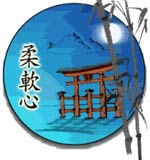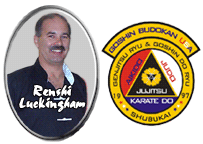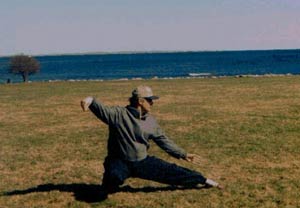




 "Ju" comes from the Chinese "jou" and the old Japanese "yawara". It refers to a young (green) sapling, and the way it
yields to force. It bends and gives way. So it means yielding, soft, pliable, to give way, to reconcile.
"Ju" comes from the Chinese "jou" and the old Japanese "yawara". It refers to a young (green) sapling, and the way it
yields to force. It bends and gives way. So it means yielding, soft, pliable, to give way, to reconcile.
 "Nan" is "juan" in Chinese. It comes from cart and soft (to the touch, like a soft, flowing beard). This is a
reference to wrapping the wheels of a cart with hair (etc.) to soften the ride. It means soft, delicate, pliable, yielding, limber, lithe, with no fixed principles, etc.
"Nan" is "juan" in Chinese. It comes from cart and soft (to the touch, like a soft, flowing beard). This is a
reference to wrapping the wheels of a cart with hair (etc.) to soften the ride. It means soft, delicate, pliable, yielding, limber, lithe, with no fixed principles, etc.
 The phrase "ju nan" is used commonly to refer to soft, pliable, flexible, elastic, supple. So to summarize,
"ju" means soft in the sense of yielding and giving away; "nan" means soft to the touch, to the senses, or in some other more general way.
The phrase "ju nan" is used commonly to refer to soft, pliable, flexible, elastic, supple. So to summarize,
"ju" means soft in the sense of yielding and giving away; "nan" means soft to the touch, to the senses, or in some other more general way.
 "Shin" refers to mind, heart, or spirit, and is a drawing of a heart.
"Shin" refers to mind, heart, or spirit, and is a drawing of a heart.
 Thus "Ju Nan Shin" refers to a spirit or state of mind that remains flexible, adaptable, not fixed
upon a single course of action or principle. It is the spirit of reconciling conflict creatively without the direct imposition of will. It is a spirit that is non-confrontational, and tends to generate a
feeling of acceptance and cooperation.
Thus "Ju Nan Shin" refers to a spirit or state of mind that remains flexible, adaptable, not fixed
upon a single course of action or principle. It is the spirit of reconciling conflict creatively without the direct imposition of will. It is a spirit that is non-confrontational, and tends to generate a
feeling of acceptance and cooperation.
I remember standing in the living room of our home in Roswell, New Mexico at 4 years old, with huge boxing gloves hoisted laboriously at chest level in a guard position. I was preparing to "get even" with the first bully of my life. Being of a "soft hearted" nature, I was an easy target, and my father was determined to change me into a 4 year old "fighting machine."
He, being of Army and Air Force background, was versed in military "hand-to-hand" combat. As it turns out, my great grandfather taught JuJutsu to the Hartford Police, so I have some "lineage" in this "stuff."
At 5, he put a toy "GI Issue M1 Rifle," bayonet, and all, in my hands and showed me how to parry, lunge, thrust, just in case I got attacked by another 5 or 6 year old boy wielding a similar weapon.
When I was 8, I took back my favorite Davy Crockett rubber knife with a very simple, but effective, one hand choke. By then, I was versed in a lot of "cool techniques" from the Army manual of self-defense.
My serious training started at 14, though, when I was watching a Kenpo class at Wheeler Air Force Base, Oahu, Hawaii. The little "old" Chinese man saw me, and invited me to try the class. He didn't know I had a war going on with asthma, and graciously declined. He wouldn't let me off that easily, and said, "Come, I teach you how to breathe."
That literally saved my life. The doctors indicated my situation was such that I would grow to be a sickly man, thin, frail, etc. Those of you who know me see they were very wrong. I owe that man my deepest gratitude as his "gift" allowed me to do martial arts, and any other physical activity I chose, all my life.
Because I went to a private military school in Honolulu, my daily schedule was up at 5 am, to catch the bus at 6, which took 2 hours to make it to school by 8 am.
I used study halls and the bus ride home to get my homework done so I can eat dinner and make training almost every night. Sunday's, I surfed!!! But that intensive got me a 1st degree black belt in 3 years.
I moved to Connecticut in 1968. Dad chose to retire over making Lt. Colonel if he went to Vietnam. He said he did two wars (he was in the Army for WW II, and a bomber pilot in the new B-47 Strato-jet used in Korea), and that was enough for him.
 I didn't find a Kenpo school here, but I tried out the 3 mainline Korean styles of Tae Kwon Do, Tang So Do, and Moo Duk Kwan. I also tried Kyokushinkai, but finally fell in love with Tong Leong
(Praying Mantis). It was that Sifu who introduced me to Tai Chi back in 1972. We didn't do the form as much as we took more from Qigong and applied that to "mantis" techniques.
I didn't find a Kenpo school here, but I tried out the 3 mainline Korean styles of Tae Kwon Do, Tang So Do, and Moo Duk Kwan. I also tried Kyokushinkai, but finally fell in love with Tong Leong
(Praying Mantis). It was that Sifu who introduced me to Tai Chi back in 1972. We didn't do the form as much as we took more from Qigong and applied that to "mantis" techniques.
At this same time, I was introduced to Judo. This art seemed "impractical" to me, until I was offered an opportunity to pit my Kenpo against the Sensei. I was converted. Those of you who've seen the Gracie Brother's realize how effective this grappling art is. All arts have their strengths and weaknesses, so cross training became an eventual goal when I decided to open a dojo someday years later.
One of my Judo Sensei also taught Kendo, which is exhausting. I learned something about Japanese etiquette from that man. One day, I was admiring a shinai (bamboo "sword" used in Kendo "play.") He came up to me and said, "You like?" Of course, as a young man in my early 20's I said, "Yes!" enthusiastically. His response was "You keep!"
"Oh no, I can't take this." He repeated himself, "You like?" I nodded that time. He said, "Good, you keep." I realized a rejection of this offer would be an insult, so I smiled and said, "Thank you."
Another favorite experience I received from Judo, which led to my studying Tai Chi eventually, was when I was 19, a brown belt going for black belt and a strong competitor at that time. My contest weight was 175, and I was 6'1". One of my Sensei's teachers was visiting. He was 4'11" and weighed about 105. He was 81 years "old." The proper protocol as the senior student was to play him first. He moved slowly out to the center of the mat, so I thought I should go easy on him.
That was a mistake.
As soon as I touched him, he tossed me like a bad habit. I shook it off, figured he was "lucky" until he repeated the experience. I decided I should "step it up." He threw me all over the place, and I couldn't stop it. To add insult to injury, every time he threw me, I would see him bow and look down at me with a boyish grin on his face saying "Ahhh, very good, but you no try hard enough." This became the standard for the rest of my session. I went through everything I had, except one technique, which I was bad at, and still don't do that well. But, I had been working it for about 3 weeks, and thought I would give it a go, what did I have to lose?
When you execute a technique in Judo perfectly, you throw someone with absolutely no effort. There is a feeling associated with that. Well, wouldn't you know I got that feeling, but unfortunately, I was distracted as in my mind I thought, "Woah& I got him!!" Well, that was enough to change the event horizon, and once again I got to see that stupid grin and hear him say "Ahhh.. VERY, VERY GOOD, but still, not try hard enough."
I shook his hand and thanked him.
As I watched him toast the others, I thought to myself if I had just 10% of his ability when I reached 40, I would be on the right path. I also noted how clear his eyes were, how sharp his mind was, the texture of his skin was not "old," and his bones weren't brittle. His timing was perfect and overrode the fact he had no strength to speak of at 81 years of age. If this is what the martial arts has to offer, I'm in for good.
So I learned some Tai Chi from another Judo Sensei who knew it, attended workshops, and visited the Tai Chi Farm as most Tai Chi players did as part of their long-term experience. I was fortunate enough to run into Zibin Guo, a Chinese martial artist who taught Tai Chi and other Chinese "gung fu" systems. I didn't know he taught Tai Chi, though. I met him at the Judo Club up at the University of Connecticut. He was a brown belt at that time. I was a 3rd degree black belt in Judo, and had a lot of experience by now. I say that to help the reader realize I should have had little trouble throwing the brown belt. However, his balance was incredible, and I had to ask how achieved it. He told me about his Tai Chi background. Until then, I had a cursory understanding of that art, but he said, he would help me get to the "root" of the art ;-)
My favorite story about my experience with Zibin was the day I came to him and asked him "Now what?" I asked that question because I felt I had done the Yang 24 posture short form "enough" now where I knew it. His response to me was "What you mean, now what?" I told him I knew the form, and I wanted to go on to something else. He said, "You do? You know the short form now?" I said, "yes" with confidence. He replied, "Good, ok... You teach me now."
My life changed.
I opened the current dojo in Manchester in October of 1992. I had many over the years doing just Judo in back yards, barns, recreation centers, "YMCA's", and miscellaneous clubs east of the river. There was much frustration with these situations as I always had to answer to someone, and could never develop the Judo program the way I wanted to. My appreciation for Tai Chi and other arts could never be fully expressed, as the day-to-day bureaucracy required me to renegotiate contracts as often as every 8 weeks. Classes ended up suspended during those periods, so we often had to start over.
I decided I could not offer anything meaningful to my potential students so long as I had to share space with other organizations. I worked extra hours at my profession to save enough money for a good mat system, and found my current location to be "perfect."
I didn't want to limit the classes to Judo, because I saw the strengths and weakness of each art, and wanted to provide cross training capability to help students close those gaps. Most importantly, I felt Tai Chi was absolutely essential since it is really fundamentally the most sound of all the arts, and is really "underneath" them all. That's why it's considered the "Ultimate Supreme" of the martial systems. Students of any system that come through Tai Chi training talk about how it improved their understanding and execution of the other art "hands down."
From the day Master Pancipanci told me he would teach me how to breathe, I have been indebted to the wisdom behind the martial way. There are no forms of exercise that offer so much to us as human beings as does any one of the arts when taught and studied in a traditional way. The "way" is consistent. It will never disappoint you or let you down. As long as you adhere to its principles, you can look forward to a rich, rewarding, and healthy life. There is only one requirement...
"Ah... very good, but you no try hard enough!"
Be well, and enjoy the journey...
Lucky Sifu/Sensei